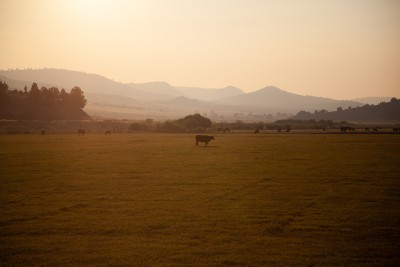By Brett Morgan and Mary Kyle McCurdy | 4.5-minute read
It is a fact that in Oregon, our seasons are getting hotter, with more wildfire on the landscape and decreases in the snowpack we rely on for drinking water and farming. Increasingly, our weather and storm patterns have been amplified. For an easy example, just look at the 2021 heat dome that shattered high-temperature records across the state and nation – something that would not have been possible if not for climate change (read our analysis on the heat dome’s impact to Oregon farmers).
The land use planning system’s current role in, and potential future contributions to, adapting to and mitigating climate change are evident:
- Farms and forests help sequester carbon.
- Urban growth boundaries help limit sprawl, and that means we build fewer roads that cause heat-trapping pavement.
- More compact communities also mean we drive shorter distances and can walk, take a bus, or bicycle to meet many of our needs – and all of those mean less greenhouse gas polluting our air.
- Urban growth boundaries also mean Oregon has sprawled much less than our western neighbors into the wildland-urban interface, and so while we have experienced large fires in recent years, we have seen fewer deaths and loss of homes than other states.
Establishing the Oregon Climate Action Plan
The governor’s 2020 executive order establishing the Oregon Climate Action Plan (OCAP) is a comprehensive strategy aimed at reducing the state's greenhouse gas emissions and addressing the effects of climate change.
The plan sets forth a range of ambitious goals, including reducing Oregon's greenhouse gas emissions to 45 percent lower than 1990 levels by 2035, and to at least 80 percent lower than 1990 levels by 2050. The plan also calls for transitioning to 100 percent clean energy by 2040, and creating new jobs in the clean-energy sector and investments in rural communities.
OCAP and Land Use
Among a series of actions state agencies and departments must take, the OCAP has four main considerations related to land use:
- Encouraging compact, mixed-use development: State policies should now promote more compact and connected urban development patterns, with a mix of uses (such as housing, stores, and services) in close proximity to each other. This is intended to reduce the need for driving, which in turn can help lower greenhouse gas emissions.
- Promoting sustainable transportation: Under the plan, the Oregon Department of Transportation must prioritize investments in transportation infrastructure that reduce greenhouse gas emissions and support walking, biking, and transit. It also calls for ODOT, local governments, and transit agencies to increase their interagency coordination to better integrate transportation and land use planning.
- Conserving natural and working lands: Recognizing the important role that forests, wetlands, and other natural and working lands can play in storing carbon and mitigating climate change, the plan calls for increased conservation and restoration of these lands, as well as the development of new markets for carbon sequestration and other ecosystem services.
- Addressing wildfire risks: The order recognizes that climate change is contributing to more frequent and severe wildfires in Oregon, calling for increased efforts to reduce the risk of wildfires through forest management, community preparedness, and other measures.
How We’re Helping the State Take This On
1000 Friends has helped our state make amazing progress on some of these initiatives by working with legislators from both sides of the political aisle across Oregon. We’ve advised on how Oregon's farm, ranch, and forest lands will play a role in the state’s response to climate change thanks to our seat on the Oregon Global Warming Commission. We have been deeply invested in matters of housing and housing density, with massive state policy wins that have expanded housing density and choice while decreasing pressures to convert natural and working lands into urban uses. We have also been a key player in wildfire discussions, including advocating successfully for passage of Oregon’s first comprehensive wildfire preparedness and resiliency program, and we are now a member of the state Wildfire Programs Advisory Council.
Looking Forward
In some areas, especially climate investments in transportation and working lands, we have a lot more work to do. While our state has taken significant steps to reduce the transportation sector’s contribution to climate change, it is not enough. Transportation-related GHG emissions represent 40 percent of Oregon’s total greenhouse gas emissions. We must make significant changes in investments in climate-friendly ways to get around that also make for more livable, healthy neighborhoods, like safe and connected sidewalks and separated bicycling paths and better transit systems. Oregon’s land use planning system has an important role to play in these efforts.
How You Can Help

Support Our Work
We can't do this work alone. We rely on the support of people like you to help us advocate for policies and practices that will protect our planet and our communities. With your help, 1000 Friends of Oregon can continue to advance sustainable land use practices, help our state reduce greenhouse gas emissions, and ensure that Oregon is doing its part to address climate change. During this 2023 legislative session, we have been hard at work advocating for legislation in transportation, rural lands, housing, wildfire resilience, and so many other areas with connections to land use and climate change.
Please consider making a donation to 1000 Friends of Oregon today. Your support will make a difference in our efforts to promote a more sustainable and equitable future for all Oregonians.
Public Engagement Opportunities
As part of the Oregon Climate Action Coalition, we need your help protecting the Climate-Friendly & Equitable Communities program. Sign this letter and testify against HB 2659 by April 4.
